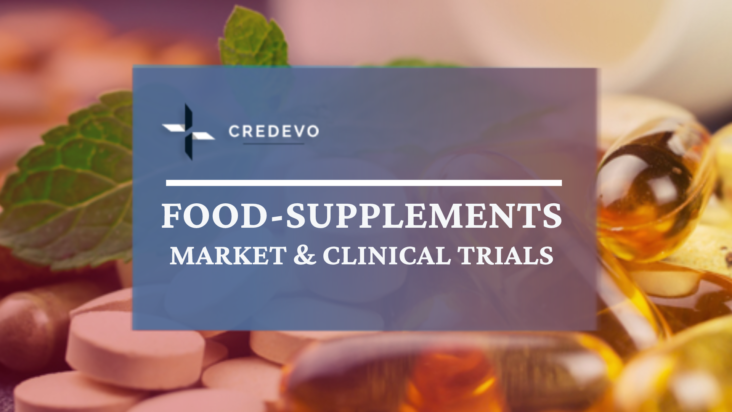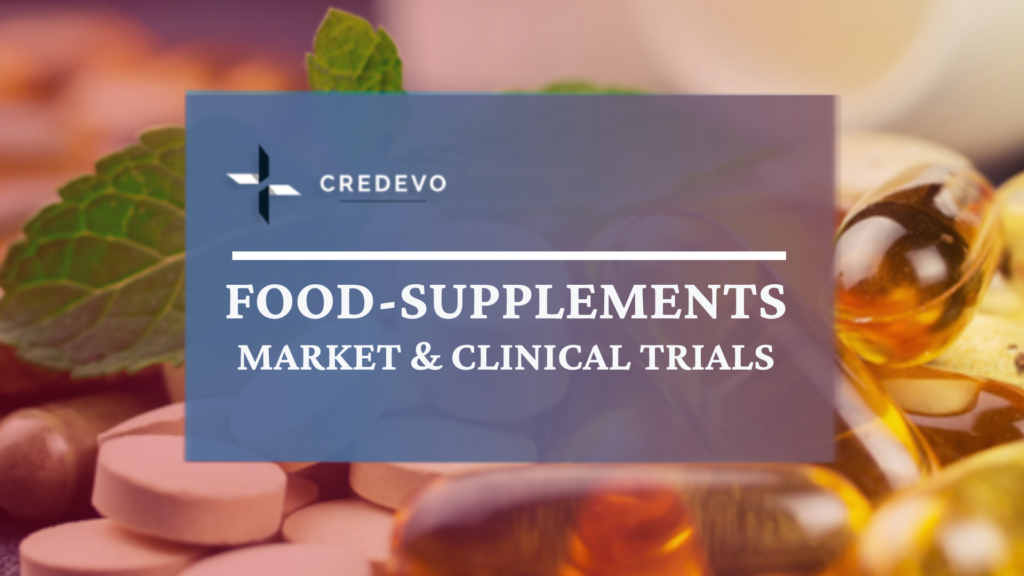Food Supplement Market, Clinical Trials & Regulatory

While people often seek dietary supplements, many have concerns regarding their potential benefits, safety, and efficacy. As a result, clinically tested and approved food supplements have a strong market presence. It is important to conduct clinical trials on dietary supplements under Good Clinical Practice (GCP) guidelines to ascertain their potential benefits.

Health and diet have gained increased attention since the start of the pandemic. Improved health and a strong immune system facilitate disease prevention and aid in faster recovery. While consuming nutritious fruits and vegetables is essential, many individuals have also incorporated nutritional supplements to fulfill their body’s nourishment requirements.
The European Food Safety Authority (EFSA) assesses the scientific evidence before approving a food supplement. The EU established EFSA under Regulation 178/2002 of the General Food Law. The FDA and the European Commission both authorize food supplements. One can make a claim to the labeling only after approval from the regulatory authorities.
Before going into the details, let’s first understand what are food supplements? as the term “food supplements” is always confused with “nutrients”.
What are food supplements?
Food supplements deliver nutrients that we do not consume with food in proper quantities. Food supplements come in a variety of dosages and combination options. Consuming more of a particular nutrient is not always preferable because our body only needs a certain amount of each vitamin to function.
Some medications may have harmful side effects when taken in excess dosages. Therefore, to properly market food supplements and safeguard customers’ health, it is necessary to fix a recommended suitable dose.
Forms of food supplements
- pills
- tablets
- capsules
- liquid
- gummies
- powders
- drinks
- energy bars
What do food supplements contain?
A food supplement may contain the following contents
- vitamins
- fiber
- proteins
- minerals
- amino acids
- fatty acids
Global food supplements market
The estimated size of the global market for dietary supplements in 2021 was USD 151.9 billion, and from 2022 to 2030, it is projected to grow at a CAGR of 8.9%.
- Fatty acids (such as those found in fish oils), probiotic supplements, and protein supplements are the main drivers of supplement demand.
- The global market for dietary supplements containing vitamins, minerals, botanical or herbal ingredients, amino acids (protein building blocks), and enzymes (complex proteins) is increasing daily.
- According to the predictions, Germany, Italy, and Poland will have a significant market share in the European market by the end of 2022. Germany, Italy, and Poland each have market value shares of 21.9%, 17.1%, and 12.7%, respectively.
- With a CAGR of 9.8%, Oceania may grow significantly throughout the projected period in South Asia and the Pacific. The need for dietary supplements to strengthen the immune system and preserve general health is increasing in Oceania.
Food supplement market in Japan, Australia, India & Malaysia
Let’s see the food supplement market overview in Japan, Australia, Malaysia, India, and Thailand.
| # | Country | Food supplement market | Regulations |
| 1 | Japan | Japan has the third-largest dietary supplement market in the world, with a market value of $9.4 billion (JPY1 trillion). | The responsibility for overseeing the importation and safety of supplements falls to the Ministry of Health, Labor, and Welfare (MHLW). The Consumer Affairs Agency (CAA) enforces the laws governing food and dietary supplement claims. Click here to learn about the food supplement regulations in Japan |
| 2 | Australia | Complementary Medicines Australia (CMA) released new data that valued Australia’s dietary supplement industry at $5.69 billion in 2020, an increase of 1.5% from the year before. The largest category, worth $3.1 billion, was vitamins and dietary supplements. In Australia, the business of vitamins and nutritional supplements accounts for more than half of the profits made by the supplementary medicine sector. The second-largest market by revenue in 2021 was sports nutrition, with over 1.5 billion Australian dollars. In 2019, general health supplements had a market share of about 17%. | The Therapeutic Goods Administration (TGA) in Australia oversees the regulation of therapeutic items such as prescription and over-the-counter drugs (AUST-R), complementary drugs (AUST-L), such as herbal remedies, vitamins, and dietary supplements), and medical devices. Click here to learn about the food supplement regulations in Australia |
| 3 | India | In 2021, the Indian market for dietary supplements had a value of INR 376.3 billion. According to IMARC Group, the market will grow at a CAGR of 14% between 2022 and 2027, reaching INR 847.9 billion. | In India, food supplement standards are under the “Food Safety and Standards Regulation in 2016” It contains standards for > Health Supplements > Nutraceuticals > Food for Special Dietary Use > Food for Special Medical Purposes > Functional Food and Novel Food) The Central FSSAI License/Registration is necessary for India for health supplements, nutraceuticals, and novel foods. |
| 4 | Malaysia | New research expects the health supplement market in Malaysia to grow at a CAGR of 7%. This may be due to an increase in the aging population, The products related to the digestive system and those that help to maintain blood sugar levels are in high demand. | In Malaysia, the Food Safety and Quality Division of the Ministry of Health Malaysia (“FSQD”) is the responsible authority that regulates food supplements. The regulation of food quality and integrity in Malaysia is governed primarily by the Food Act 1983 (“Act”) |
| 5 | Thailand | Market researchers expect the Thailand food supplement to grow at a CAGR of 15-20%. The demand for Beauty supplements, weight loss, and sports nutrition is constant and will fuel market growth. | The Thai Food and Drug Administration (Thai FDA) of the Ministry of Public Health (MOPH) is responsible for regulating food products under the Food Act. The main regulation controlling all Foods in Thailand is the Food Act B.E. 2522 (1979). |
Do we need to conduct clinical trials for food supplements?
Foods, including fruits, vegetables, and dietary supplements derived from plants and animals, have been advertised on the internet for their alleged capacity to fend off disease or even treat it. Patients frequently ask their physicians about the effectiveness and safety of these products.
Numerous preclinical studies and nonrandomized clinical trials have demonstrated the safety of these dietary supplements. Hospitals are not exempt from sponsoring these campaigns. These studies seek to give doctors reliable answers to patient’s questions about the effectiveness and safety of dietary supplements and their possible health benefits.
Businesses use the results of clinical trials to expand into new markets, substantiate irrational claims, or look into potential new regulatory paths.
Clinical research can open up business opportunities for dietary supplements.
How to conduct a clinical trial for a food supplement?
The significance of the preliminary research
The first thing to consider when designing a clinical trial for a dietary supplement is whether there is sufficient data to proceed with clinical research. Before moving into the clinic, there should be convincing proof of efficacy and unequivocal evidence of safety to answer this question.
Even though there are significant physiologic and pharmacological differences between species, any concerns about acute or chronic toxicity will stop the drug from being used for the first time in humans.
Safety studies are necessary when the supplement is prepared and administered to human subjects as a dietary supplement, despite any potential ethnopharmacological history as food or a natural remedy.
How to choose the study population
When conducting a clinical trial using supplements, it is necessary to select participants who are representative of the target market for the product.
The focus should be on people who belong to those groups, whether they are women, athletes, seniors, or other groups. Exclusion criteria typically include prescription medications, dietary supplements, and acute and chronic illnesses.
Administrative dosage and timing
For the first time in humans, we use the calculation of food supplement doses from those evaluated in animal research.
Allometric scaling integrates the appropriate power functions that link body surface area and weight to various physiological parameters across animal species (HED) to determine human equivalent dosages.
Regulations to be considered
One must think about the ultimate objective of the investigation from a regulatory standpoint. An Investigational New Drug (IND) application may need to be submitted to the U.S. FDA if the study’s objective is to determine whether the supplement can be used to diagnose, treat, cure, or prevent any disease. An IND is not mandatory if the study’s only goal is to assess the pharmacodynamics.
Feasibility studies for sites and investigators
One of the initial stages of running a clinical trial for supplements is determining their viability. This process entails evaluating internal and environmental conditions, aligning the clinical trial with the local environment in terms of study design, investigational product dose, comparator, and patient type, and evaluating the feasibility of conducting clinical trials in a particular nation.
The micro-feasibility is at the site or investigator level, which involves determining whether or not to collaborate with an investigator and identifying problems and potential fixes.
Clinical aspects
The investigator-level feasibility evaluation helps in understanding,
- Whether a prospective investigator is ready to provide standard care.
- The patient population is treated or observed by the potential investigator as opposed to the actual study population.
- Acceptance of comparison therapy and background information.
- Comfort with the application of technology and tools.
Site demographics
Site statistics assist us in identifying,
- A hospital or outpatient setting for clinical practice
- Previous involvement in clinical trials
- The nurses, pharmacists, and study coordinators are easily accessible.
Site demographics help to assess the site’s or investigator’s “competency” to conduct the clinical trial.
Recruitment and retention
The most crucial part of the site’s feasibility is recruitment and retention. It assists us in determining the potential for recruitment of predicted subjects each month and across the entire trial. It aids in determining whether we want to investigate more sites and monitor site performance throughout study execution.
Aspects of ethics: This aids in the preparation and launch of the site. It covers the general process of obtaining ethics clearance as well as the needs of the ethics committee, translation requirements, etc.
Site infrastructure
The majority of clinical studies have unique needs for the handling and processing of supplements. Therefore, evaluating the site’s capabilities concerning such requirements is crucial, including
- If the necessary resources are on-site or need to be purchased.
- Whether the team has the skills to carry out these tasks and operate the necessary equipment.
Most studies will also include e-CRFs that enable us to assess whether sites can use electronic data collection and their familiarity with such technologies.
Quality
Whether sites have already completed sponsor or independent-site audits is a further factor we need to consider. Second, in recent years, the FDA, EMEA, and other regulatory organizations have conducted site inspections in India and other developing nations. Additionally, this aids teams in giving enough training and allocating the right resources during the initial startup phase.
Conclusion
Clinical research is particularly challenging for dietary supplements. Designing clinical studies with clinically relevant endpoints in mind is a good idea. One needs to pay close attention to transferring preclinical findings to the clinical setting. Doing so will ensure that the clinical study’s design thoroughly explores the experimental question.
Are You Looking For Regulatory Or Clinical Trial Related Support For Food Supplements?
Credevo provides end-to-end solutions, from conducting clinical trials to registering your food supplements globally. Provide your required details in the form to connect with us and explore our services.